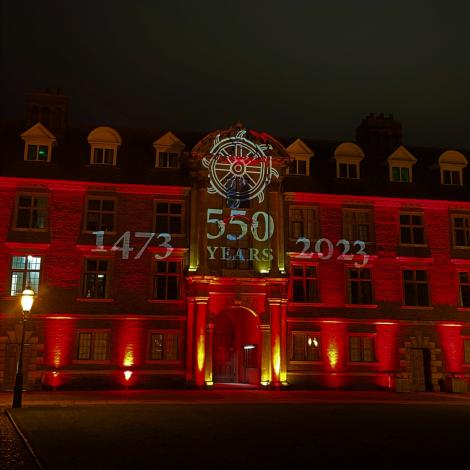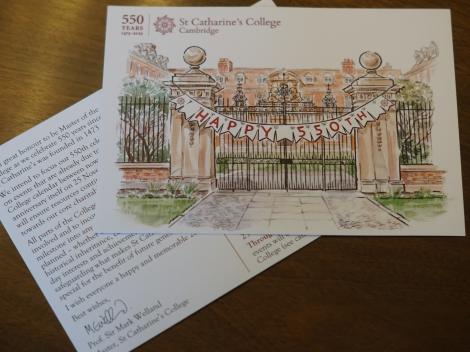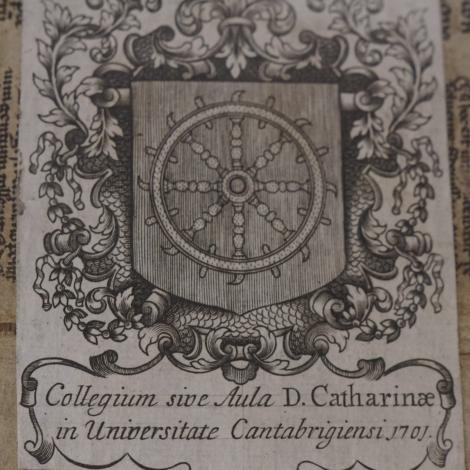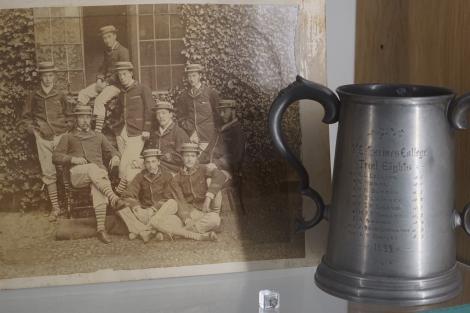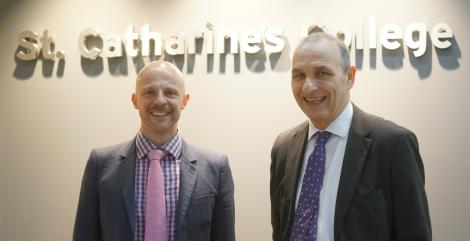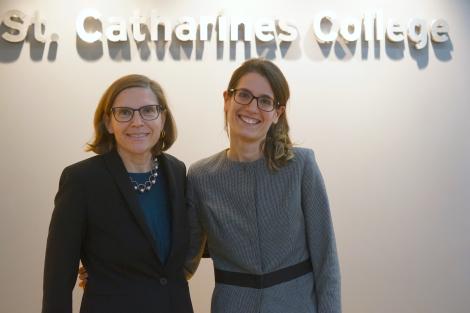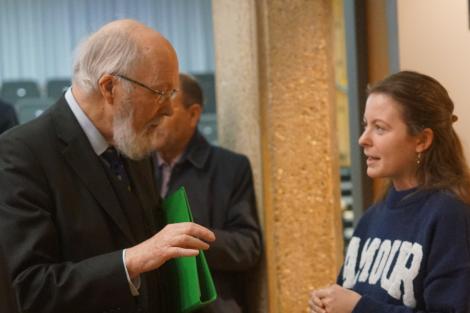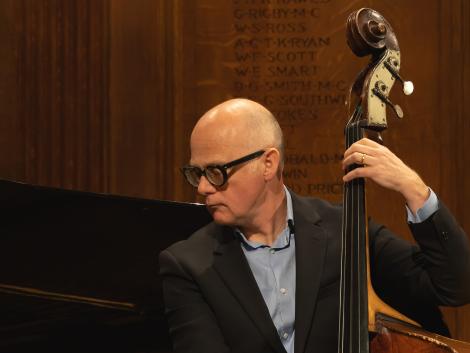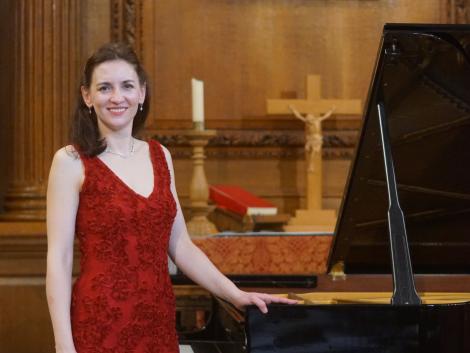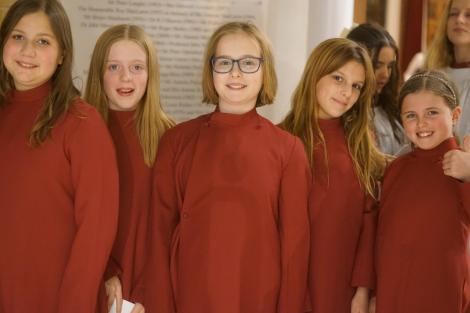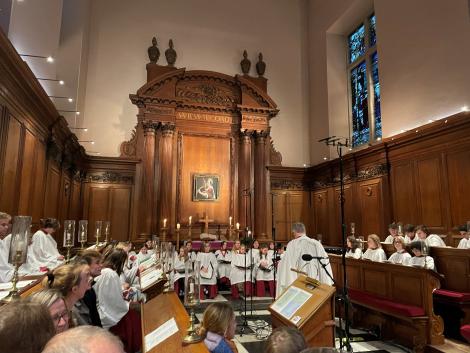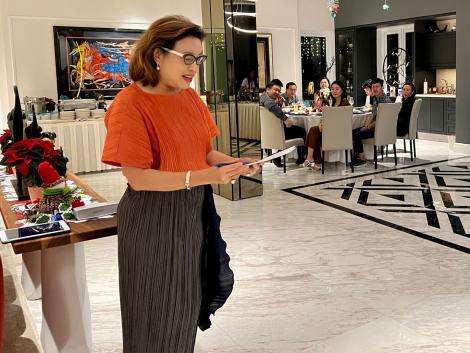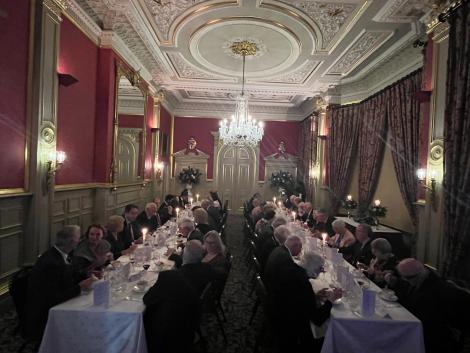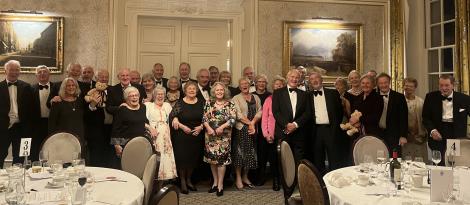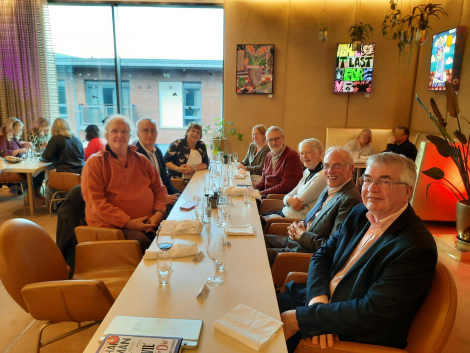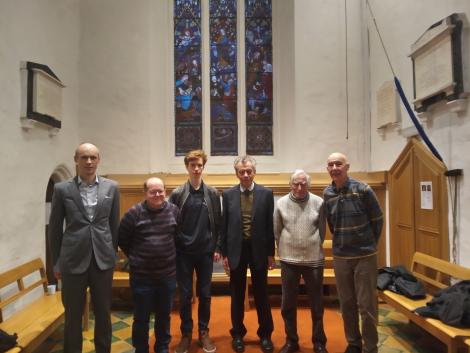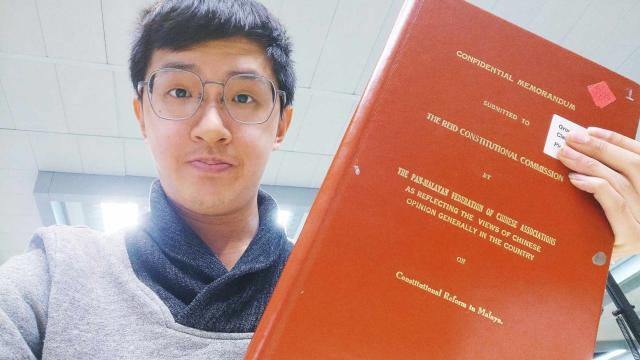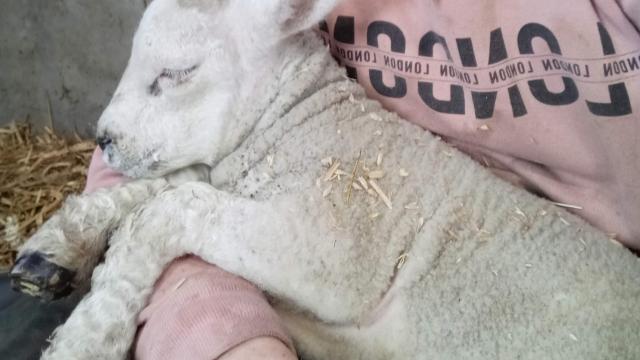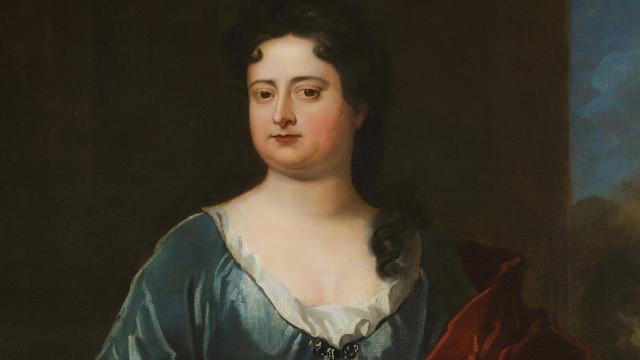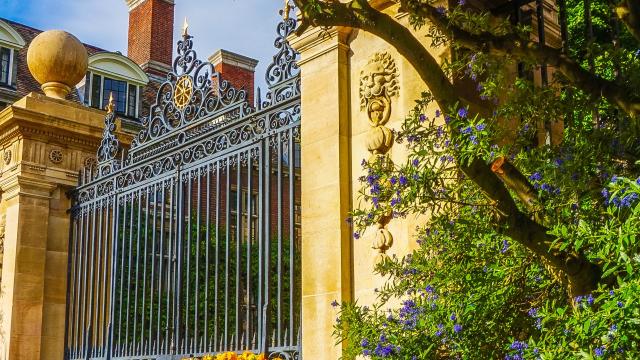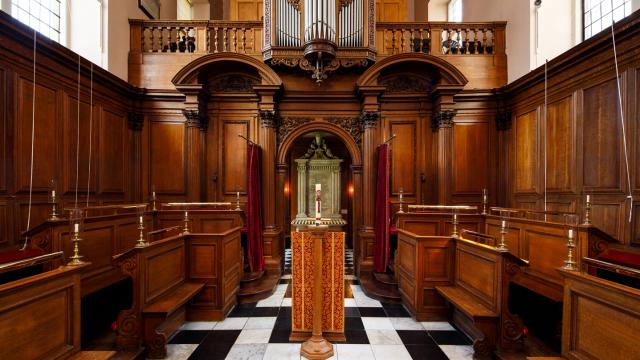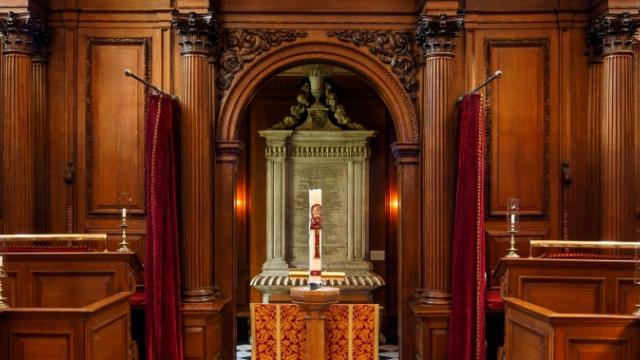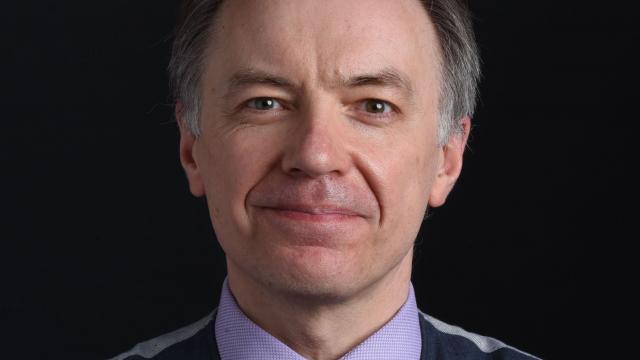
St Catharine’s College turned 550 on 25 November 2023, the Feast of St Catharine’s, and the College community has been proud to celebrate this important milestone by reflecting on our historical inheritance, applauding our present-day achievements, and honouring the generosity of benefactors over successive generations.
Sir John Benger (1979, English; Master 2023)
“As an alumnus and now Master of St Catharine’s, I take great comfort in how the College has survived periods of upheaval, financial insecurity and social change over the centuries to become the welcoming, thriving and vibrant academic community that we know today. One reason for our survival must surely be the sense of community and loyalty that has been clear from the celebrations of our 550th anniversary in recent weeks. Thank you to each and every person who has contributed to making these celebrations so meaningful and memorable.”
Visual celebrations of our history
St Catharine’s created a special iteration of its logo to mark the anniversary celebrations. This logo was the centrepiece of an eye-catching light show in Main Court at the beginning of the year, featured in two animated timelines about the College’s history and its proud connections with medicine, and will be seen on a new kit for the men’s football team that makes its debut next term. The logo was introduced on a special postcard from Professor Sir Mark Welland (Master 2016–23), which was delivered to all students, staff and Fellows in College in January 2023 to highlight this special anniversary.
From November 2023 until March 2024, a number of exhibitions have been organised by the Library & Archive team for the St Catharine’s community to enjoy:
| Atrium ground floor | Items from the College Archive, Library, art and heritage collections charting the history of St Catharine’s from 1473 to the present. |
| Shakeshaft Library | Items relating to Bishop Thomas Sherlock (Master 1714–19), and the history of the Sherlock Library. |
| McGrath Centre (unless closed for private events) | The changing face of our three College Courts over the past century. |
| Ramsden Room (unless closed for private events) | The library of alumnus John Addenbrooke, with a rotating display of collection highlights. |
| Atrium first floor | A showcase of publications by members of the Fellowship. |
| Gallery above Hall | Ongoing research into the Library’s 1633 catalogue, and what it tells us about St Catharine’s in the early 17th century, led by alumnus Dr Simone Monti (2019, Italian) who is now pursuing a Master’s in Library Studies at UCL. |
St Catharine’s has also commissioned Scala Arts & Heritage to publish a new official history to chronicle the College’s foundation in 1473 and subsequent development as a welcoming, thriving and vibrant academic community in the heart of Cambridge, supported by a network of 10,000 alumni around the world. The College is indebted to Peter (1974, Natural Sciences; Honorary Fellow 2019) and Christina (2016; Honorary Fellow 2019) Dawson and Roger (1989, History) and Sophie Morley for supporting this new publication. Dr Sarah Paris (2015, Biological Anthropology), Christopher Catling (1975, English) and Roger Stratford (1960, Natural Sciences; Fellow Commoner 1992) kindly contributed to the development of this text, which was edited by Kat Steer, Communications Manager, and Dr Colin Higgins (2018). This history – the first to be published by the College since 1997 – will be available from early 2024.
Interview series
To showcase the world-class research conducted by students and Fellows of St Catharine’s, a special series of interviews was published on the College’s website over several months with:
- Astronomer Dr Sophie Koudmani (2021) about 2023 also marking 550 years since the birth of Nicolaus Copernicus and the advances in our understanding of the Universe since 1473. Read the article.
- Historian Dr Christa Lundberg (2022) about the events of 1473 in higher education and the context in which St Catharine’s was founded. Read the article.
- The Economics Fellows on their research into poverty and inequality, given that $5.50 per day was the poverty line for upper-middle-income countries for many years. Read the article.
- Alumnus Kit Treadwell (2019, Anglo-Saxon, Norse & Celtic), then an MPhil student and now returning for a PhD, about Cambridge before St Catharine's was founded. Read the article.
- Dr Edward Wickham (2003), Fellow and Director of Music, on music in 1473 and 2023. Read the article.
Lecture series
St Catharine’s hosted a series of free public lectures in the McGrath Centre that were well-attended by students, staff, Fellows and alumni. In February, we were delighted to welcome Professor Sir Magdi Habib Yacoub OM FRS for a special Addenbrooke Lecture. He spoke on ‘Equity in healthcare delivery from theory to practice’ and shared how his foundation is ensuring more equitable access to healthcare in Egypt. In May, Professor Julian Allwood (2018), our Dudley Robinson Professorial Fellow in Engineering, gave a special lecture on environmental sustainability. He discussed why climate mitigation and other good societal goals aren’t happening and how the College community could be involved in novel approaches to making good things happen.
The remaining lectures were all scheduled in November, starting on 21 November with a special Henn Lecture by Professor Daniel Wakelin FBA, formerly a Junior Research Fellow at St Catharine's (2002–04). Now Jeremy Griffiths Professor of Medieval English Palaeography at the University of Oxford, Professor Wakelin focused his lecture on 'English writing in 1473'. He advised that 1473 was an unremarkable year for English literature, with the notable exception of the printing of the first book in English, William Caxton’s own translation of Raoul Lefèvre's Recueil des Histoires de Troye – albeit it was printed in Ghent. However, Professor Wakelin’s lecture was far from unremarkable as he discussed a rich array of poetry, political writing and propaganda, letters, inventories, account books and other practical writing, demonstrating the variety of ‘everyday writing’ in English at the time of the College’s foundation, many forms of which would have been familiar to our founder and early Fellowship, and some examples of which may well have been among the first library holdings at St Catharine’s. Professor Wakelin illustrated his lecture with numerous examples of medieval manuscripts, including some from the College’s own collection.
Dr Hester Lees-Jeffries (2006), Fellow and Director of Studies in English at St Catharine’s, organised the Henn Lecture and said:
“It was such a pleasure to welcome Dan Wakelin back to St Catharine’s. His lecture was packed with fascinating material, vividly illustrated and compellingly argued; despite its accessibility, his lecture was, in fact, highly original in its methodology, exploring how even some of the most mundane medieval texts still shaped communities and identities, and formed and expressed relationships. A civic account book isn’t a literary text, for instance, but Dan demonstrated that its details (wine for the mayor’s guests) can still conjure a world of occasions and encounters, glimpses of a world at once distant and familiar.”
Caitlin Moore, a second-year English undergraduate from St Catharine’s, added:
“Professor Wakelin's lecture helped us to connect with people from the year of our foundation through literature. I particularly enjoyed thinking about how different forms of 'everyday' writing can give a real insight into the past, alongside the key medieval texts we usually study.”
On 24 November, there was a special Bayly Memorial Lecture. This biennial lecture is given in memory of the late Professor Sir Christopher Bayly (1970; Honorary Fellow 2014). This year's speaker, Professor Francesca Trivellato, Andrew W. Mellon Professor of Early Modern European History at the Institute for Advanced Study (Princeton), started by saying that, while she had never met Sir Christopher in person, she was nonetheless grateful for his work as it “offers so much even for those, like me, who are not specialists of India or the British Empire”. In place of the advertised title, Professor Trivellato chose to address the question ‘Can we rescue global history from the law of diminishing returns?’ and ruminated on the status of global history today, following its “seemingly irresistible rise”. She argued that historians have to acknowledge the implicit paradoxes facing global history and treat it as “a lever" capable of generating new questions, rather than a discipline or a method in its own right.
Dr Valentina Caldari (2018), Fellow and Director of Studies in History at St Catharine’s, organised the Bayly Lecture and commented:
“Professor Trivellato’s books from The Familiarity of Strangers to her 2019 The Promise and Peril of Credit display the most rigorous archival research and a masterful use of scales; and her contributions to the discipline have gone much beyond her interest in early modernity. The lecture was thought-provoking and engaging, assessing method (or lack thereof) as well as the questions we ask of the past. I am very thankful – and feel incredibly lucky – to have had the pleasure of hosting her for this special Bayly Lecture.”
Madeleine Thompson-McRae, a third-year History undergraduate from St Catharine’s, attended the lecture and reflected:
“The Bayly Lecture was important in highlighting the problems and limitations of Global History today, especially the difficulties of actually pinning down the meaning of the topic that Professor Trivellato touched upon. All in all, it was so interesting to see how history is discussed in a highly academic context, how the field has changed considerably in the last 20 years and the opportunities for new scholarship to add to our understanding.”
Last but by no means least was the 550th Anniversary Lecture by Professor Sir John Baker (1971; Honorary Fellow 2012) on 25 November, St Catharine’s Day itself. Sir John took the audience on a journey through the College’s Archive and his own personal collection to share what he had learned about Robert Woodlark, founder of St Catharine’s, and the College’s early years. He argued that the foundation of the College is “the greatest enigma in the history of the English higher education system” since we cannot definitively explain Woodlark’s decision to invest in a new institution rather than enrich King’s College (where he was Provost) and that it was unique for the head of one Cambridge College to found another College. He cited an absence of evidence for Woodlark’s birthplace and place of burial as indicative of the gaps in our knowledge about our founder and, rather aptly, shared a piece of advice from the Wildlife Trusts’ website warning that “the secretive woodlark can be hard to spot”.
Professor Katharine Dell (1996), President of St Catharine’s, said:
“We learned from John Baker's stimulating and informative lecture that Robert Woodlark first set up St Catharine's as a chantry chapel and small community to pray for his soul. What a long way we have come from those early medieval roots to become the strong educational establishment we are today! We are grateful for John for his research into this fascinating start to our College history 550 years ago and thank him again for sharing his findings with us.”
Seb Porter, a third-year Geography undergraduate and JCR President 2022–23, added:
“Sir John’s lecture provided great insights to the history and foundations of St Catharine’s, which also highlighted how much is still unknown. His witty and humorous tone made the lecture enjoyable for everyone in the audience and we very much appreciate the time he took to educate us on this fascinating story.”
Music
St Catharine’s has a proud musical tradition, so it was fitting that music figured prominently in the 550th anniversary celebrations. The programme in November started with a special event on 17 November featuring Nigel Hess (1971, Music; Honorary Fellow 2016) and Robert Saxton (1972, Music; Honorary Fellow 2015) in conversation. These two distinguished alumni kindly spoke about their careers as composer, how their time at St Catharine’s had influenced their lives, and the changing business of music-making. They also selected the piece of music they most wished they had composed – Mahler’s Resurrection Symphony for Nigel, and Debussy’s Cello Sonata for Robert.
Next, on 23 November, the Cambridge Early Music Consort sung music in honour of St Catharine from the late 15th century for a special Nightsongs service in the Chapel. The service was preceded by an introductory talk by Dr Edward Wickham.
Alumnus Sandy Burnett (1983, Music) returned to St Catharine’s on 24 November with his jazz trio Tenor Madness for a special Kellaway Concert with the Cambridge Jazz Festival. The programme featured music by William Byrd – the anniversary of whose death falls this year – reinterpreted in a jazz idiom; alongside newly composed motets by Christopher Fox, inspired by Byrd’s Mass for Four Voices.
International pianist and alumna Ivana Gavrić (1998, Music) kindly returned for a special St Catharine’s Day recital. Her programme included thoughtful touches such as ‘Two Nocturnes Op. 50’ by Dora Pejačević (the 100th anniversary of her death was also celebrated at the 2023 Proms) and homages dedicated to Ivana by Cheryl Frances-Hoad, who was also studying at Cambridge while Ivana was at St Catharine’s. Ivana also commented that her three years at the College “were the most formative and life-changing years of my life”.
The Choirs of St Catharine’s College were also closely involved in the anniversary celebrations. The Girls’ Choir welcomed the newest choristers in an induction ceremony on 25 November, and both the Girls’ Choir and College Choir sung at the Advent Sunday service broadcast live on BBC Radio 4 on 3 December.
Dr Wickham reflected, “It has been a joy to celebrate this important anniversary with music from the earliest years of St Catharine’s alongside the very latest music commissioned by the College. At the same time, it has brought together current musicians from the College with several distinguished musical alumni – a reminder of the great tradition of music-making we enjoy at St Catharine’s. Many thanks to all involved. I believe we have appropriately fulfilled our pious duty to our patron saint.”
Commemoration of benefactors
St Catharine’s Day is traditionally a day of commemoration for the St Catharine’s community, when we remember and give thanks for our founder and the benefactors who supported the College’s development over the centuries. The Commemoration Service in Chapel included a reading of the names of benefactors, a lesson read by Poppy Lee (a second-year HSPS undergraduate and JCR President 2023–24) and a sermon by the Very Revd Mark Bonney (1975, Music), Dean of Ely Cathedral.
The day ended with the Commemoration Dinner, which is held annually to bring together Fellows and scholars (students awarded a first or distinction during their end of year examinations) for a celebratory meal in the Hall. In his speech at the dinner, the Master looked back over the College’s proud history, before paying tribute to the present-day community:
“Around half the 20,000 or so people who have ever attended St Catharine’s are alive today. So although we are 550 years old, it seems likely this College will have so much more to contribute both to individual lives and the wider world. And that is a cause for celebration.”
Alumni celebrations
Singapore
Dr Li-Ann Wee (1996, Medical Sciences) and her husband, Dr Tan Chi Chiu, hosted a wonderful alumni dinner at their home in Singapore on 24 November to celebrate St Catharine’s Day and the 550th anniversary. They named the tables “1473”, “550” and “Catz” and decorated them in the College colours. Dr Wee read out a message from the Master.
London
Alumni who are members of the Oxford & Cambridge Club gathered in London on 24 November for a dinner to mark St Catharine's Day. This year was the 17th time such a dinner has been held, it being the original idea of alumnus Brian Woodham (1961, Mechanical Sciences). From 2024 onwards Alexander Most (2001, Natural Sciences) will fully take over organising the evening on behalf of members, who reported:
“Brian, along with the club's banqueting teams have created an annual tradition that we hope members will continue to eagerly add to diaries for many years to come. It is a wonderful and somewhat lively evening to celebrate and reminisce on our shared experiences of Catz. I thank Brian and the Club for all their work in establishing and organising the dinner to date. A total of 48 members and their guests made up the cohort, many of whom were sporting claret and rose ties, cufflinks and other suitable Catharinian adornments. I was delighted read out a message of best wishes from the Master, Sir John Benger (1979, Master 2023), which included details of other events taking place to mark St Catharine's Day in the College's 550th year. Thomas Prifti (1954, Law) was the father of the dinner.
“John Oakes (1961, English) atmospherically sang the College Grace before we sat down. Joanna Reeves (1988, History/MML), Chair of the St Catharine's College Alumni Society (in its centenary year), proposed a toast to the College and St Catharine, and Sir Richard Dales (1961, MML) proposed the loyal toast.
“During the evening a College flag belonging to the Society was flown from the clubhouse flagpole. Said flag has made a number of far-flung trips with Catz alumni, including a polar expedition, and it looked majestic as it billowed over Pall Mall in the crisp November night air.”
In addition, Sandie Deane (née Hogg; 1983, Management Studies) organised a St Catharine’s Day dinner for a group of 1983 matriculands and their partners in London. The occasion celebrated 40 years since their matriculation as well as toasting the College on its 550th anniversary. Embellishments permitted by the restaurant included a replica College flag, posters on a ‘Cool for Catz’ theme, and place cards and menu cards kindly provided by the College’s conferencing team.
Sandie said, “Although we all now have a wide variety of interesting and in some cases prominent roles, the years since being at College seemed to melt away and we all concluded none of us had changed a bit.”
Epsom
Steve Tinton (1967, Geography) organised a hugely successful dinner for alumni and their partners at the Royal Automobile Club in Epsom on 25 November. St Catharine’s teddy bears were used as table centrepieces and auctioned off at the end of the evening to raise funds for the College. A message from the Master was read out, followed by a toast to the College.
Bristol
Eight alumni and friends celebrated St Catharine's Day in Bristol. Organised by Denis Nightingale (1975, History) for members of the South-West branch of the St Catharine's Alumni Society, alumni travelled from Cornwall and Exeter to mark the special occasion. A message from the Master was read out and an enjoyable afternoon was had by all.
Cambridge
A group of six St Catharine’s campanologists kindly rang bells in celebration of the College’s 550th anniversary, including a new method named after St Catharine’s (“Saynt Kateryns Hall Treble Place Minor”) and the first time that a band of campanologists has consisted entirely of College members. In total, the group achieved 6,906 changes over an estimated ringing time of around 4 hours in six different churches. Their performances have been added to BellBoard, the online record of the weekly journal for bellringers.
Find out more from our earlier article about the group and their bellringing. They were joined by a seventh alumnus, Sam Johnson (2012, Natural Sciences), for the ringing on the evening of St Catharine’s Day itself.
